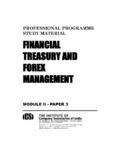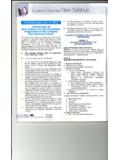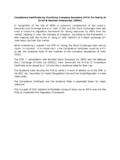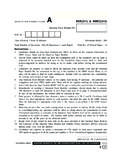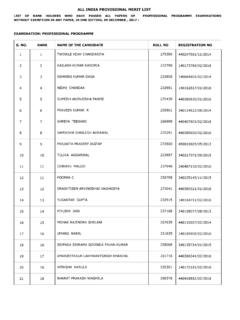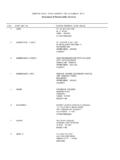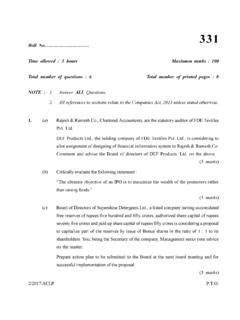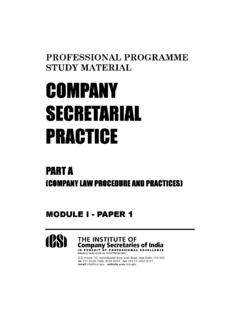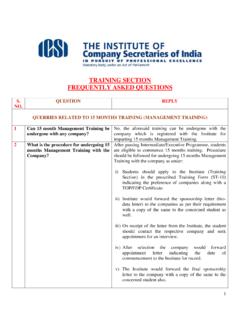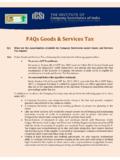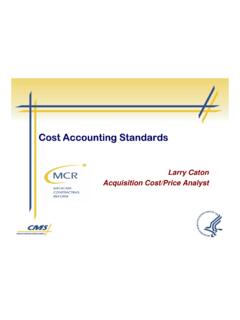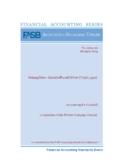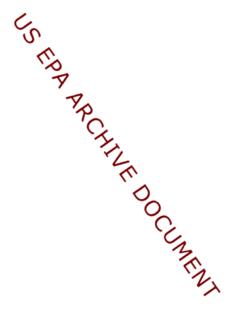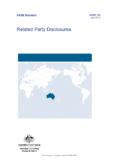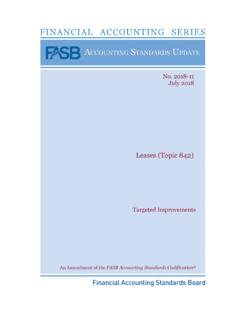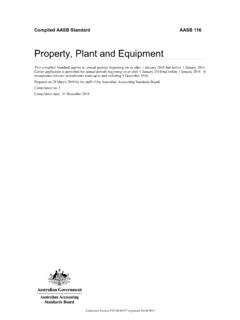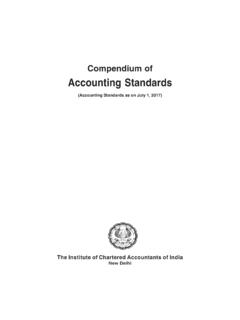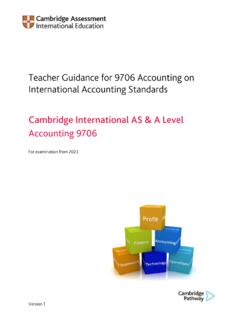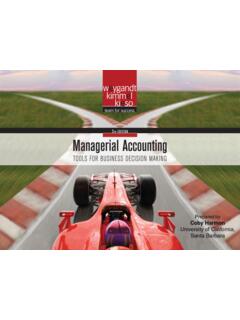Transcription of Company Accounts, Cost and Management Accounting - ICSI
1 EXECUTIVE PROGRAMME. STUDY MATERIAL. Company . ACCOUNTS, cost . AND Management . Accounting . MODULE I - PAPER 2. ICSI House, 22, Institutional Area, Lodi Road, New Delhi 110 003. tel 011-4534 1000, 4150 4444 fax +91-11-2462 6727. email website THE INSTITUTE OF Company SECRETARIES OF INDIA. TIMING OF HEADQUARTERS. Monday to Friday Office timings to Public dealing timings Without financial transactions to With financial transactions to Phones: 41504444, 45341000. Grams: COMPSEC. Fax: 011-24626727. Website: E-mail: Laser Typesetting by Delhi Computer Services, Dwarka, New Delhi, and Printed at Printers, NOIDA/. EXECUTIVE PROGRAMME.
2 Company ACCOUNTS, cost AND. Management Accounting . Finance and Accounting have assumed much importance in today's competitive world of business wherein corporate organisations have to show the true and fair view of their financial position. Thus, the application of Accounting in the business sector has become an indispensable factor. Of course, the Company secretary has to provide the complete and accurate information about the financial operations of the Company to his superiors to take decisions. This emphasises that the books of account are to be maintained accurately, up-to-date and as per the norms. Considering the significance of the matter the subject Company Accounts has been prescribed in our syllabus with the objective to provide conceptual understanding of the principles involved in the maintenance of Company accounts in accordance with the provisions of Company law.
3 While designing the contents of the syllabus, it has been presumed that the students possess the knowledge of the basic principles of Accountancy, prescribed for the Foundation Programme. Besides, the students have requisite knowledge of legal provisions of the Companies Act, 1956 and the procedures prescribed there under. The subject cost and Management Accounting ' is very important and useful for optimum utilisation of existing resources. It is an indispensable discipline for corporate Management , as the information collected and presented to Management based on cost and Management Accounting techniques helps Management to solve not only specific problems but also guides them in decision making.
4 Keeping in view the importance of this subject, various topics on cost and Management Accounting have been prescribed in the syllabus of our course with the objective of acquainting the students with the basic concepts used in cost Accounting and Management Accounting having a bearing on managerial decision-making. The entire paper has been discussed in sixteen study lessons, divided into two parts viz. Part-A and Part-B. Part-A deals with Company Accounts while Part-B deals with cost and Management Accounting . This study material has been updated upto June, 2011. The topics on Company Accounts have been discussed in seven study lessons comprising the various Accounting aspects of joint stock companies.
5 While in cost and Management Accounting every efforts has been made to give a comprehensive coverage of all the topics relevant to the subject. In all study lessons the requisite theoretical framework for understanding the practical problems in the subject has been explained and wherever necessary practical illustrations have been given to facilitate better understanding. At the end of each study lesson a good blend of theoretical and practical questions have been given under the caption Self Test Questions' for the practice of students to test their knowledge. In fact, this being a practical (iv). paper, students need to have good theoretical knowledge and practice to attain the requisite proficiency and confidence.
6 Therefore, in order to supplement the information/contents given in the study material, students are advised to refer to the Suggested Readings mentioned in the study material, Student Company Secretary, Business Dailies and Journals. In the event of any doubt, students may write to the Directorate of Academics and Professional Development in the Institute for clarification. Although care has been taken in publishing this study material, yet the possibility of errors, omissions and/or discrepancies cannot be ruled out. This publication is released with an understanding that the Institute shall not be responsible for any errors, omissions and/or discrepancies or any action taken in that behalf.
7 Should there be any discrepancy, error or omission noted in the study material, the Institute shall be obliged if the same are brought to its notice for issue of corrigendum in the Student Company Secretary. (v). EXECUTIVE PROGRAMME. SYLLABUS. FOR. PAPER 2: Company ACCOUNTS, cost AND. Management Accounting . Level of knowledge: Working knowledge. Objectives: (i) To provide working knowledge of Accounting principles and procedures for companies in accordance with the statutory requirements. (ii) To acquaint the students with cost and Management Accounting techniques and practices. Detailed contents: PART A: Company ACCOUNTS (50 MARKS).
8 1. Accounting standards - relevance and significance; national and international Accounting standards . 2. Accounting for share capital transactions - issue of shares at par, at premium and at discount; forfeiture and re-issue of shares; buy-back of shares;. redemption of preference shares; rights issue. 3. Issue of debentures - Accounting treatment and procedures; redemption of debentures; conversion of debentures into shares. 4. Underwriting of issues; acquisition of business; profits prior to incorporation;. treatment of preliminary expenses. 5. Preparation and presentation of final accounts of joint stock companies as per Company law requirements; bonus shares.
9 6. Holding and subsidiary companies - Accounting treatment and disclosures;. consolidation of accounts. 7. Valuation of shares and intangible assets. PART B: cost AND Management Accounting (50 MARKS). 8. cost Accounting objectives of costing system; cost concepts and cost classification; Management Accounting nature and scope; role of Management accountant, tools and techniques of Management Accounting ;. distinction between financial Accounting , cost Accounting and Management Accounting . 9. Elements of cost : (i) Material cost purchase procedures, store keeping and inventory control, fixing of minimum, maximum and re-order levels, ABC analysis, pricing of receipts and issue of material and Accounting thereof; Accounting and (vi).
10 Control of wastage, spoilage and defectives. (ii) Labour cost classification of labour costs, payroll procedures, monetary and non-monetary incentive schemes; labour turnover and remedial measures; treatment of idle time and overtime. (iii) Direct expenses nature, collection and classification of direct expenses and its treatment. (iv) Overheads nature, classification, collection, allocation, apportionment, absorption and control of overheads. 10. Methods of costing - unit costing, contract costing. 11. Budgetary control preparation of various types of budgets, advantages and limitations; budgetary control reports to Management .
